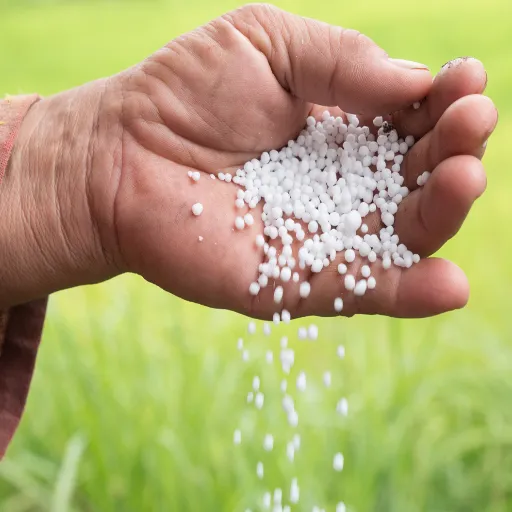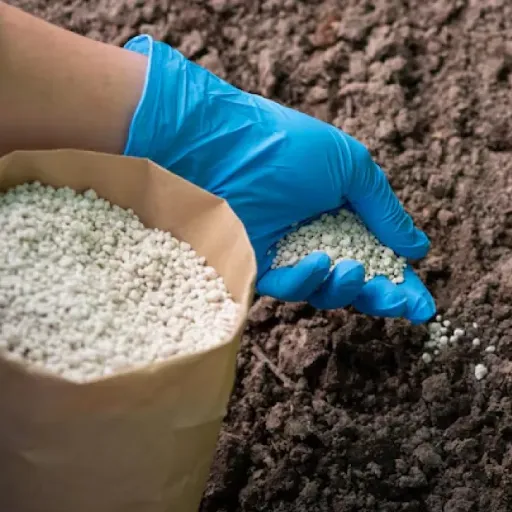Ammonium sulfate, a nitrogen fertilizer, is known for its effective role in reducing ammonia volatilization, especially in the modern-day agricultural setup. Ammonia volatilization refers to the nitrogen loss as ammonia gas from the soil surface. If this is not properly handled, it can cause a drastic drop in crop yield and nutrient efficiency. In this article, we will discuss the distinct features of ammonium sulfate, the role it plays in reducing ammonia losses, and its impact in sustainable agricultural practices. If you are an agronomist, farmer, or simply interested in the topic of soil management, this discussion will provide you deep insights into the working of ammonium sulfate and its importance in preserving the soil conditions.
Understanding Ammonia Volatilization

What is Ammonia Volatilization?
Ammonia volatilization is the process by which ammonia (NH₃) gas is emitted from the soil. This process looks to occur in the fertilization of soils using urea or ammonium sulfate. Using such fertilizers without mixing or covering the soil leads to ammonia volatilization. Such nitrogen loss also leads to the inefficiency of such fertilizers. Under specified conditions, ammonia gas is also released from such soils.
Ammonia volatilization greatly depends on certain factors. For instance, the soil pH is a critical factor, where higher pH levels, particularly those above pH 7, create desirable conditions for the conversion of ammonium (NH₄⁺) to ammonia gas. The temperature and moisture content of the soil also affect the process, where higher temperatures and the existence of surface water speed up ammonia loss. Soils with low cation exchange capacities or a low buffering capacity tend to have higher rates of volatilization as well.
The effects of ammonia volatilization matter significantly in terms of agricultural yields and the environment. Having large amounts of nitrogen lost leads to a decrease in nutrients available for crops, which in turn leads to decreased yields and increased production costs. From an ecological point of view, volatilized ammonia can contribute to air pollution, acid rain, and eutrophication of water bodies. The effective management of ammonia volatilization, in this case, is very important in combating the issues of nitrogen efficiency and in providing the necessary tools for sustainable agriculture.
Factors Influencing Ammonia Volatilization Loss
The loss of ammonia volatilization is a concern for many interacting factors, such as soil properties, environmental conditions, fertilization, and its method of management. The understanding of these factors in relation to fertilization is important in combating the loss of nitrogen.
- Soil Properties: The risk of ammonia volatilization increases with soil pH. For instance, an alkaline soil with a pH greater than 7 has a greater risk of volatilization because of the higher availability of ammonium ions that can change to ammonia gas. In addition, soils that have a high sand content or low buffering capacity have a higher volatilization risk because of their decreased ability to hold ammonium.
- Environmental Conditions: The moisture and temperature of an area matter with respect to the volatilization of ammonia. The conversion of ammonium to ammonia gas increases with temperature, whereas the loss of nitrogen increases when urea is dispersed and hot and windy conditions persist. On the other hand, dry soils may lower the rate of volatilization and pose a threat only when strong winds follow the application.
- Fertilizer Characteristics and Placement: The extent of volatilization is determined by the kind and placement of fertilizer. In the absence of prompt incorporation into the soil, urea-based fertilizers are known to incur losses. Such losses, especially in warm and alkaline soils, increase when fertilizers are left on the soil surface. Use of controlled-release urea-based fertilizers, as well as urease inhibitor-based stabilizers, helps in containing ammonia emissions.
- Management Practices: The fertilizer application method and time are equally important. Cooler periods in a day are ideal for fertilization; it should be done promptly after incorporation and a few days of planned rainfall. Implementing split applications in accordance with crop demand is one of the effective measures to improve nitrogen retention and reduce volatilization.
By considering these factors comprehensively, loss of ammonia volatilization can be minimized, which also reduces the environmental impact of nitrogen use.
Impacts of Ammonia Volatilization on Soil Health
Ammonia volatilization impacts the soil as a whole by affecting the chemical composition of the soil and its productivity. The volatilization of ammonia means that there is less ammonia available to the crops, which directly impacts the growth and the yield of the crops. Moreover, the soil’s chemistry is changed, which can lead to severe imbalances in the nutrient cycles and microbial activity. Below are five detailed impacts of ammonia volatilization on soil health:
- 1
Depletion of Nitrogen in the Soil: Volatilization of ammonia results in the loss of nitrogen in the soil. Nitrogen is a vital nutrient for the development of plants. Research has shown that the process of ammonia volatilization can contribute to the loss of up to 50% of the surface-applied urea if the conditions are not favourable. - 2
Reduction in Soil Fertility: This consecutively reduces the levels of available nitrogen to the soil, which in turn means that the fertility of the soil deteriorates over a period of time. This tends to incur more costs as increasing fertilizer inputs are required to sustain productivity. - 3
Alkalisation of the Soil Surface: The volatilization of ammonia tends to change the pH level of the soil surface, leading to the formation of a more alkaline environment. Such a pH shift tends to disrupt the solubility of nutrients, especially micronutrients iron and zinc. - 4
Disruption of Soil Microbial Communities: The shift of the soil nutrients and pH due to ammonia volatilisation tends to change the soil microbial variability and microbial activities negatively. Microbial activities play an essential role in organic decomposition and nutrient cycling. - 5
Increase in Soil Surface Crust Formation: The loss of nitrogen tends to lead to degradation processes in the soil, such as the formation of crusts on the soil surface. Crusts on the soil surface tend to inhibit water infiltration and root penetration, leading to further soil productivity problems.
The implications of the environmental challenges witnessed today increase the importance of effective nitrogen management techniques to reduce ammonia volatility related to the preservation of sustainable soil and agricultural productivity.
The Role of Ammonium Sulfate as a Fertilizer

Chemical Composition of Ammonium Sulfate
Ammonium sulfate (NH₄)₂SO₄ contains the ammonium ion (NH₄⁺) and the sulfate ion (SO₄²⁻) as its components. This salt is produced when ammonia interacts with sulfuric acid. From this interaction, a crystalline salt is produced that has a high solubility in water. Its solubility makes ammonium sulfate an efficient and readily available source of nitrogen for plants to absorb. Additionally, sulfate is an important source of sulfur, which plays a vital role in plant protein synthesis.
The nitrogen contained in ammonium sulfate accounts for 21% of its weight, while the sulfur it contains is about 24%. This composition allows it to function as a dual nutrient in providing both nitrogen and sulfur to the deficient soils. In particular, the ammonium ion (NH₄⁺) is useful in soils of low pH due to the fact that it is less likely to be leached in comparison to nitrate fertilizers. This further enhances the availability of nitrogen to the crops.
In regions where sulfur deficiencies are prevalent, sulphate fertilizers are of prime importance. The relative ease of application and chemical stability of ammonium sulfate supplements the need for such fertilizers. In addition, its acidic properties serve to moderate alkaline soils and improve micronutrient availability under specific conditions. These attributes highlight its effectiveness as a fertilizer, as it aids in the enhancement of crop growth and also supports soil reclamation when used under appropriate agronomic practices.
Comparison with Other Nitrogen Fertilizers
Ammonium sulfate nitrogen-based fertilizer, was compared to urea and ammonium nitrate using attributes nitrogen content, solubility, pH impact, and environmental impacts.
| Aspect | Ammonium Sulfate | Urea | Ammonium Nitrate |
|---|---|---|---|
| N Content (%) | 21% | 46% | 34% |
| Dissolvability | Moderate | High | High |
| Soil Reaction | Acidic | Neutral | Neutral |
| Runoff Risk | Low | High | High |
| S Content (%) | 24% | None | None |
| Release Speed | Slow | Fast | Fast |
| Expense | Higher | Lower | Moderate |
| Soil Fit | Acidic/Alkaline | Acidic | Alkaline |
| Eco Impact | Safer | High wastage | Pollution risk |
Mechanisms of Action in Reducing Volatilization
Because of its chemical makeup and acidic characteristics, ammonium sulfate is essential to lessening nitrogen volatilization. This process, where nitrogen escapes as ammonia gas, poses a big challenge in applying nitrogen fertilizer, especially in soils with a high pH or on the soil surface. Situated in ammonium sulfate, the ammonium nitrogen is far less at risk for volatilization than the urea-based fertilizers, as it does not undergo enzymatic conversion to ammonium hydroxide, which is a key compound associated with gaseous loss.
Moreover, the ammonium sulfate is acidic in nature and aids in reducing the soil pH in the area where it is applied. This pH reduction curbs volatilization as the conversion of ammonium (NH4⁺) to ammonia (NH3) gas is pH dependent and gets inhibited with a decrease in soil pH, thus lowering nitrogen losses. Studies have shown that in alkaline soils, the threat of volatilization is the greatest, and ammonium sulfate is effective in such conditions. Further, research has shown that the use of ammonium sulfate fertilizer enhances the nitrogen use efficiency (NUE), ensuring steady nutrient availability to plants and improved yields under controlled conditions.
The use of ammonium sulfate fertilizer not only aids in optimizing agricultural resource use but also ensures the conservation of the environment by reducing volatilization of nitrogen under correct agronomic methods, like application during fewer hot, dry periods and cooler arid periods or immediate soil application or incorporation of the fertilizer.
Benefits of Using Ammonium Sulfate
Improved Nitrogen Utilization Efficiency
Ammonium sulfate is known for improving the efficiency with which crops use nitrogen. Its formula provides for 21% nitrogen in the ammonium (NH₄⁺) form, which is less susceptible to leaching losses than nitrate-based fertilizers. The ammonium form is held by the soil’s cation exchange complex and, through nitrification, is transformed to nitrate (NO₃⁻). This process leads to improved nitrogen availability for plants over a longer period. For this reason, ammonium sulfate is especially useful in soils with high leaching potential, like sandy soils or soils in regions with heavy rainfall.
Besides that, the use of ammonium sulfate is advantageous because it supplies sulfur in the sulfate (SO₄²⁻) form, which is an essential secondary macronutrient for plants. Sulfur is heavily involved in the synthesis of amino acids and proteins, which are critical components of a plant’s growth and development. By efficiently supplying nitrogen and sulfur, ammonium sulfate, therefore, eliminates nutrient imbalance, promotes adequate nutrient uptake, and supports optimal crop yield.
Integrating ammonium sulfate in precision agriculture greatly improves nitrogen use efficiency (NUE) as it curbs nitrogen losses through volatilization, denitrification, and leaching. For instance, it is well documented that ammonium sulfate application on acidic or slightly acidic soils greatly suppresses ammonia volatilization as opposed to urea and its derivatives. Therefore, ammonium sulfate is an important fertilizer in modern nutrient management as it balances productivity with environmental protection.
Enhanced Crop Yields and Quality
Using ammonium sulfate specifically as a fertilizer designed to increase crop yields and produce quality is well justified. The synthesis of sulfur and nitrogen, with 24% and 21% respectively, caters to nutrient provisions that are eagerly sought by a multitude of crops and especially by high-demand ones, such as canola, onions, and legumes. Ammonium sulfate makes significant contributions in fulfilling the nutrient demands of crops in critical growth phases, ensuring the yield expectations are met. Ample research has shown that during these stages, crops tend to improve their photosynthetic functionality and protein synthesis, leading to more efficient crops. This translates into superior quality crops and a higher return on investment.
Additionally, in the narrower sense of the agricultural world as opposed to the broader global spectrum, ammonium sulfate somewhat enhances soil nutrient equilibrium, a matter of concern for agriculture as a whole. The fertilizer tends to lower the soil pH in alkaline soils, improving the availability of key micronutrients like zinc, iron, and manganese. These crucial nutrients are required in specific enzymatic and metabolic processes, thus improving the crop quality during the growth period in nutritional value, texture, storage life, and balancing other related features. Other studies are showing that during fertilization, balance can culminate in incorporating ammonium sulfate being crucial as it leads to an increase in the metro grade of produce, which is a great vehicle for farmers to aim for. During its alleviating quality constraints, ammonium sulfate is quite invaluable.
Using ammonium sulfate in a targeted way also prevents nutrient shortfalls and promotes uniform development in varied soil types. To illustrate, soils that are deficient in sulfur can be treated with this fertilizer, which helps to clear up yellowing and restricted growth, which are typical symptoms of sulfur deficiency. These improvements are often followed by better root growth, which allows plants to more effectively tap into water and nutrients. As a result, crops and soils having a lack of balance of essential nutrients trust ammonium sulfate as the core in nutrient management systems that blend best agronomic practices, modern agriculture, and precision farming to maintain a reasonable environmental ecosystem and support higher yield.
Environmental Advantages of Ammonium Sulfate
The use of ammonium sulfate as a fertilizer is an example of good agricultural practice, giving good environmental results. For instance, in contrast to fertilizers, which are urea-based, ammonium sulfate has a very low potential for nitrogen volatilization. An example of nitrogen volatilization is the process through which ammonia gas gets lost to the atmosphere, thus causing air pollution and low nitrogen use efficiency. Such losses are minimized with ammonium sulfate due to its composition; thus, more nitrogen can be retained in the soil and made available for crops.
Moreover, ammonium sulfate fertilizer supplements an essential nutrient, sulfur, which is a macronutrient that soils typically lack because of strictly enforced air quality regulations limiting industrial emissions. With the proper levels of sulfur in the soil restored, crops benefit from enhanced protein synthesis as well as enzyme production, which leads to better growth and higher yields. Since such supplementation is focused, there is no need for other inputs, which lowers the risk of nutrient runoff and water pollution.
Incorporating ammonium sulfate fertilizers into precision farming allows them to be distributed in an accurate and planned manner, reducing the chance of overfertilization, which has other negative environmental impacts such as eutrophication. Its dual-purpose functionality in supplying both ammonium nitrogen and sulfur enables proper nutrient management, which sustains the soil fertility and has less impact on the environment. This contributes to sustainable farming practices since optimized resource use is achieved along with environmental preservation.
Best Practices for Application

Recommended Application Rates for Various Crops
The correct prescription of ammonium sulfate fertilizer depends on the crop, soil, and nutrient needs to be met. Recommendations following best agronomic practices for different crops are provided as follows:
- 🌽
Maize: Considering the initial nitrogen level of the soil, use ammonium sulfate to provide 50–70 pounds of nitrogen per acre for maize crops. This method also provides the necessary sulfate to the maize to aid protein synthesis. - 🌾
Wheat: Apply fertilizers to provide 30–60 pounds of nitrogen per acre, with focus on sulfate-deficient soils. For better results, a split application is preferred, with half applied during planting and the rest during early tillering. - 🌾
Rice: For paddy cultivation, fertilizer can be applied to achieve 40–60 pounds of nitrogen per acre. Sulfur helps to maintain the quality of the grain, providing essential sulfur and nitrogen during waterlogged conditions. - 🫘
Soybeans: In sulfur-deficient soils, 15–25 pounds of sulfur per acre from ammonium sulfate can be beneficial for pod formation and yield, although soybeans fix their own nitrogen. - 🌱
Grasslands: For the production of quality forage, 30–50 pounds of nitrogen per acre should be used, depending on the stocking rate and pasture make-up. Sulfur helps in the vigorous growth of both grasses and legumes.
These application rates must be tailored to meet the results of the soil tests, local guidelines, and the crop nutrient needs. Nutrients must not be over-applied to prevent unnecessary nutrient leaching and pollution. Nutrient management must be integrated with precision agriculture technologies, such as GIS mapping, nutrient management, and soil sensors, for greater efficiency and sustainability.
Timing of Application to Minimize Volatilization
The fertilizer timing is essential to minimize nitrogen volatilization, especially for urea-based fertilizers. Fertilizer application should be planned for times when the weather would reduce volatilization losses. Fertilizer application on moist but unsaturated soils reduces surface exposure and increases infiltration. The chance of nitrogen escaping into the atmosphere is reduced when there is low wind and cool temperatures.
As per research, having fertilizers ready to apply just before a 0.25-inch or greater rainfall helps in rapid nutrient integration to the soil, thus reducing surface volatilization. However, too much rainfall should be guarded against, as it may cause runoff and nutrient loss along with environmental pollution. Applying fertilizers in smaller multiple doses during a single growing season also leads to better nutrient uptake and should be encouraged.
With the help of new real-time weather monitoring and forecasting systems, precision agriculture technologies can schedule fertilizer application for times when volatilization would be minimized. This method ensures that the application of nutrients is controlled and helps to save money in the long run, as well as protect the environment.
Application Methods for Optimal Results
- 1
Broadcast Spreading: Broadcast spreading means placing fertilizers uniformly over the entire field using mechanical spreaders. Studies have shown that this method works well for large-scale crop production. However, it can cause nutrient losses if it is not synchronized with rainfall or soil incorporation. Such losses can be prevented using precision agriculture tools that can improve the forecast of when such losses might occur. Using such tools, the nutrient efficiency can be improved by 20% compared to the old methods. - 2
Band Application: This form of application aims to place the nutrients into the soil and near the seedling rows, usually during planting. This form of application is proven to increase nutrient availability by 30% compared to broadcasting the nutrients on the surface. This improvement comes as a result of the nutrients being less exposed to volatilization and runoff. This application is especially important for the application of phosphorus and potassium fertilizers. - 3
Foliar Feeding: Foliar feeding is the process of applying nutrients to plants in liquid form. While foliar feeding does not replace soil application, it can be very effective in dealing with micronutrient deficiencies at critical growth stages. It has been shown in research that foliar applications of micronutrients such as zinc and manganese, when done during the peak growing periods, can increase the crop yield by 15%. - 4
Side-Dressing: Side-dressing refers to the application of fertilizers alongside the plant rows after emergence, which is often integrated with irrigated systems. This method helps to minimize nutrient losses and provides the crops with sufficient nitrogen during the early to mid-growth phases. It has been demonstrated that side-dressing nitrogen fertilizers enhances the mitigation of environmental nitrogen loss by as much as 40%. - 5
Drip Fertigation: Drip fertigation is the combined nutrient delivery and irrigation of a drip irrigation system, allowing for even and precise nutrient application. It is marked as one of the best devotion methods in terms of water and nutrient use, which increased by 50%, and is ideal for high-value crops such as fruits and vegetables. Drip fertigation significantly reduces leaching and runoff as it delivers nutrients to the root zone.
Combining these methods with accurate application and well-informed scheduling could ensure substantially increased nutrient use efficiency, which is economically beneficial in addition to being environmentally sustainable.
Environmental Considerations

Mitigating Ammonia Emissions Through Proper Use
Ammonia emission mitigation is a complex task that requires the integration of technology and data-driven solutions in effective management practices. One of the most critical is the timing of nitrogen-based fertilizer applications. Data suggest that the use of fertilizers during periods of low volatilization potential, for instance, in the early morning and late evening, can help reduce ammonia losses by 30%. Moreover, the use of urease inhibitors is beneficial as they slow the conversion of urea into ammonia, thus enabling nitrogen to remain available for plant uptake for a longer period.
Injection directly into the soil is an example of the minimally invasive subsurface application methods that reduce ammonia emissions. For instance, soil injection, as compared to surface broadcasting, has been shown to reduce ammonia volatilization by over 90%. Additionally, the use of cover crops aids in the retention of soil nitrogen as these crops serve as a biological barrier that helps reduce ammonia emissions while enhancing soil conditions.
Real-time data integration from soil and weather systems can bring more efficiency to these approaches. For instance, automated systems can measure soil moisture, temperature, and pH, all of which are key factors in ammonia volatilization. Use of such data can assure that applications are done with precision and that fertilizers are used in a cost-effective and eco-friendly manner.
Understanding local physical and climatic conditions allows effective use of such data to craft localized interventions that greatly reduce ammonia emissions and, at the same time, preserve agricultural output.
Concerns Related to Overuse of Ammonium Sulfate
The excessive application of ammonium sulfate in agriculture has multiple implications, both from an environmental and agronomic perspective. Here are five major concerns:
- 1
Soil Acidification: The sustained application of AS over a long period leads to soil acidification because of a drop in soil pH. This impacts nutrient accessibility and, over time, leads to a reduction in crop yield, particularly in soils with low buffering capacity. As per studies, soils that underwent treatment with high rates of ammonium sulfate showed a pH decline by a maximum of 0.5 units within 3 years. - 2
Nitrate Leaching: Ammonium sulfate’s nitrogen is converted to nitrate in the soil, which is extremely mobile and leaches easily into groundwater. The high level of nitrates in water sources leads to eutrophication and poses other health threats, such as methemoglobinemia or “blue baby syndrome.” Research shows that nitrate leaching increases by 25 to 30% with the excess application of nitrogen. - 3
Salt Buildup in Soil: Ammonium sulfate results in elevated salt levels in the soil and consequent osmotic stress on the plants. Salinization of the soil structure and water uptake of the crops leads to stunted growth. Crops in areas with excess ammonium sulfate show an increase in the sodium adsorption ratio (SAR) of up to 15%. - 4
Ammonia Volatilization: Volatilization of ammonia tends to occur under high temperature and low soil moisture when ammonium sulfate is applied in excess. Ammonia releases under these conditions lead to inefficiencies in nitrogen supply. Excess ammonia in the atmosphere contributes to air pollution and particulate matter. Improperly managed nitrogen applications lose as much as 40% of the applied nitrogen. - 5
Disturbance of Microbial Activity: The application of ammonium sulfate results in an imbalance of the microbial activity of the soil. Useful microorganisms, such as nitrogen-fixing bacteria and mycorrhizal fungi, are inhibited, which results in the loss of soil fertility and productivity in the long run. There is a 20-25 % decline in microbial activity in plots that are over-treated, which has been empirically observed. This negatively impacts nutrient cycling along with organic matter decomposition.
These challenges can be effectively addressed through appropriate soil management practices such as soil testing, nutrient management planning, precision farming, and the adoption of integrated nutrient management systems to avoid the negative consequences that ammonium sulfate misuse can trigger.
Long-term Soil Health and Sustainability
Maintaining soil health and sustainability requires balanced action in order to preserve productivity with minimum environmental harm. In my opinion, the solution involves adopting practices that are ecologically and agriculturally effective. For example, soil testing can accurately identify the nutrient levels and deficiencies, which in turn facilitates fine-tuning of fertilizer application and lowers the probability of over-application. The use of precision agriculture instruments like GPS-based fertilizer application systems improves application and helps prevent localized nutrient imbalances.
To me, the integration of organic matter into soil management systems is crucial for ensuring the sustainability of soil ecosystems. The use of compost, cover crops, and residue mulching improves not only the physical structure of the soil but also the microbial activity, which facilitates the natural nutrient cycling systems. Such practices help reduce dependence on synthetic fertilizers such as ammonium sulfate by adding organic matter to the soil, which helps sustain soil fertility in the long run. In addition, diversified crop rotations aid in avoiding the exhaustion of specific nutrients and contribute to improved soil health.
Integrated nutrient management strategies must be adopted to ensure the desired sustainable results. From my point of view, it is important to ensure there is a balance between the chemical fertilizers and organic amendments, and also the use of conservation tillage to reduce the chances of soil erosion is vital. Prioritizing the use of data and information in making decisions and responsible care of land makes it possible to safeguard soil norms and maintain its productivity, and to preserve it for the generations to come. These practices exemplify the need to take a holistic and anticipatory approach in the matters of soil health in the distant future.
Frequently Asked Questions (FAQ)
Q: What is ammonium sulfate fertilizer, and how does it affect ammonia volatilization?
A: Ammonium sulfate fertilizer is a staple nitrogen source in modern agriculture. It supplies nitrogen in the ammonium form, which is vulnerable to ammonia volatilization. Volatilization is an ecological phenomenon defined as the loss of ammonia (NH3) gas from the soil surface, especially in the presence of fertilizers. Effective fertilizer management necessitates a thorough understanding of volatilization and other mechanisms of nitrogen loss.
Q: How does volatilization from ammonium sulfate compare to other nitrogen fertilizers?
A: Ammonium sulfate volatilization tends to be most significant in dry, warm conditions and can be notable quite earlier than that of urea fertilizers. Urea and ammonium sulfate both have unique forms of ammonia loss as they vary with climate and soil. For doping efficiency, there are field tests that reveal that the ammonia volatilization from ammonium sulfate is highly dependent on climate and soil types.
Q: What are the main factors affecting ammonia volatilization from surface applications of ammonium sulfate?
A: In calcareous soils, there may be an increased risk of ammonia loss resulting from elevated pH levels. In attempting to minimize such losses, vegetation and temperature may also play an important role. Soil moisture, temperature, vegetation, and ammonium sulfate, in conjunction with calcareous soil, are especially important in mitigating the amount of loss that may result from poor nitrogen utilization.
Q: What are the environmental impacts of ammonia volatilization from ammonium sulfate?
A: Ammonia volatilized from ammonium sulfate fertilization poorly contributes toward greenhouse gases and fertilizer nitrogen losses. Released ammonia has implications regarding the air and water qualities, as it may help in the eutrophication of water bodies. Crop productivity may be sustained if efforts are made to minimize such emissions and improve fertilizer management policies.
Q: What steps can farmers take to avoid the volatilization-related losses of ammonium sulfate?
A: The use of enhanced-efficiency fertilizers, delayed application at higher humidities and lower temperatures, and incorporation immediately following application are some of the methods to reduce volatilization losses of ammonium sulfate.
Q: What is the significance of measuring ammonia emissions in relation to ammonium sulfate use?
A: Measuring ammonia emissions is important to properly evaluate the efficiency of ammonium sulfate fertilizer as a nitrogen source and its potential environmental consequences. Estimating ammonia emissions from fertilizers allows for informed fertilizer management decisions, which are necessary for proper nitrogen use efficiency and amelioration of air and water pollution as a result of excess nutrients.
Q: Are there alternatives to ammonium sulfate that minimize ammonia volatilization?
A: Fertilizers containing calcium sulfate dihydrate or other nitrogen fertilizers can be useful as alternatives to ammonium sulfate for minimizing ammonia volatilization. Moreover, the use of potassium or magnesium sulfate in combination with ammonium sulfate can alleviate the problem of volatilization, in addition to achieving other desired nutrient balance requirements.
Q: Compared to ammonium sulfate, how does urea fertilizer application affect ammonia volatilization?
A: Without incorporation, urea fertilizers tend to exhibit higher ammonia volatilization compared to ammonium sulfate. While both fertilizers lose ammonia, the quantity of ammonia lost and the process of volatilization differ. Understanding such contrasts is crucial in advising farmers to select the most appropriate fertilizer source depending on soil and climate conditions.
Q: How does ammonia volatilization affect nitrogen management in agriculture?
A: It is already apparent that ammonia volatilization is an issue that poses a challenge to nitrogen management, specifically, that it reduces the nitrogen content in the soil. Also, volatilization poses a threat to the subsequent crop yield and profitability. There are easily exploitable opportunities to reduce volatilization, which farmers can implement through prudent management of ammonium fertilizers in conjunction with other sources of nitrogen.
References
- 📚
Auburn University: Investigation into the emission of ammonia from fertilizers used on turf grasses, focusing on ammonium sulfate and other nitrogen sources. - 📚
University of Minnesota: Examination of the kinetics of ammonia emission from soils treated with ammonium sulfate. - 📚
Oregon State University: Studies on ammonia volatilization from nitrogen fertilizers, with particular attention to ammonium sulfate.







